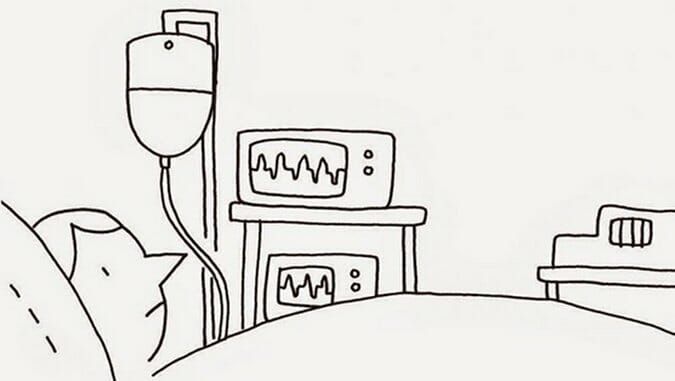The Hospital Suite by John Porcellino

Writer & Artist: John Porcellino
Publisher: Drawn & Quarterly
Release Date: September 23, 2014
Best known for his long-running self-published minicomic King-Cat, John Porcellino also maintains a sideline of autobiographical work. His new graphic novel The Hospital Suite fits nicely into this genre, but more narrowly, it also serves as an entry in the “health memoir” subgenre that dates back at least as far as Robert Burton’s The Anatomy of Melancholy. Comics seem especially well-suited to this kind of effort, whether they chronicle illnesses mental (Marbles, Hyperbole and a Half), physical (Our Cancer Year, Mom’s Cancer) or a combination (Julia Wertz’s work, Calling Dr. Laura). Perhaps this niche flourishes because the intensity of comic creation requires a certain personality (inward-focused, neurotic) to succeed in the field. But Porcellino’s self portrait of years battling mysterious ailments is, if anything, impressively open to the world.
The cartoonist’s recognizable style calls to mind a New Yorker cartoon: spare use of lines, simplified figures and objects, basic panel layout and no color. Although it can appear childlike, the aesthetic perfectly suits this story, in which Porcellino progressively loses everything that means something to him, only to find ever-greater meditative focus and acceptance. He wastes away physically, he loses his wife and home, he can’t work, he can’t eat, he’s in chronic pain and his mind ruminates obsessively. Medication and therapy don’t work wonders. But Porcellino deals with his adversity astonishingly well, repeating the Buddhist Heart Sutra to himself and taking its realization that all in life is emptiness as a great comfort. He also — though he doesn’t explicitly state this — seems to take his cat as a model of behavior, living in the moment as much as possible to appreciate basic pleasures without becoming attached to them.
This approach has problems specific to the field of autobiographical comics. When a creator draws what is, essentially, a diary, the story may take its time to form a progressive narrative, instead feeling like a succession of one damn thing after another. Some comics writers (Alison Bechdel, Art Spiegelman) have managed to escape this trap, but most of them don’t. The nature of Porcellino’s illnesses, which proceeds recursively rather than in a crescendo, can make the story feel static.
-

-

-

-

-

-

-

-

-

-

-

-

-

-

-

-

-

-

-

-

-

-

-

-

-

-

-

-

-

-

-

-

-

-

-

-

-

-

-

-












































